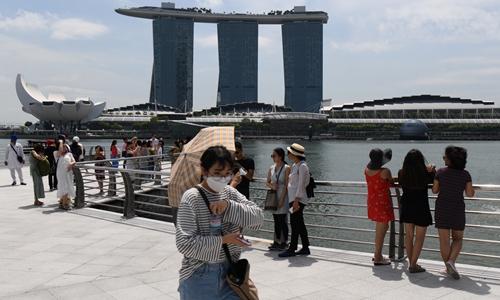HOME >> OPINION
Strong detection capability, tough measures help Singapore weather COVID-19 shock
By Koh Chin Yee Source:Global Times Published: 2020/2/18 19:46:30

A visitor, wearing a protective facemask amid fears about the spread of the COVID-19, walks along Merlion Park in Singapore on Monday. Photo: AFP
Singapore's handling of the novel coronavirus (COVID-19) pandemic consists of a layered strategy that is devised based on calculated risk.
This strategy consists of three parts - detection, isolation and treatment; public communication; and managing the pandemic aftermath.
In Singapore, detecting and tracking COVID-19 cases and their close contacts is not only done by health officials. Seasoned detectives using techniques to solving crimes are being deployed to track suspected cases.
Confirmed cases are immediately sent for treatment, while close contacts are quarantined. To break the import of COVID-19, Singapore denies entries to foreigner traveling from the Chinese mainland, regardless of their nationality. On the first day this measure was taken, 15 foreigners were denied entry to Singapore, five of whom were Chinese.
Returning Singapore residents are given a 14-day leave of absence from jobs and must stay at home, although they are allowed to leave their homes briefly, for meals or to buy household supplies. They are also put under surveillance and subject to unscheduled checks.
Anticipating the return of some 30,000 work pass holders from China in the next few weeks, the government replaced the leave-of-absence order with a stricter Stay Home notice on Tuesday. This tougher measure prohibits quarantined people from leaving their home for 14 days and offenders can be charged and face either a hefty fine or a six-month jail term or both.
Medical bills for confirmed and suspect cases are being paid for by the government, and employees who are in quarantine will continue to receive full salaries from their employers in Singapore. These measures will help make patients, close contacts and recent travelers from China less motivated to evade detection and isolation.
A report by Harvard T. H. Chan School of Public Health posted on Friday assessed the country as having a near-perfect detection capacity. It suggests that if all countries had the same detection capacity as Singapore, 2.8 times the current number of imported cases would have been detected.
Public communications is vital in handling a national crisis with such a wide, deep and prolonged impact as COVID-19. The Singapore government quickly set up its "Gov.sg" Whatsapp account to push information to residents in Singapore. These timely messages are made in all four official languages - English, Chinese, Malay and Tamil, and contain daily updates, new government measures, advice wearing a mask and washing hands, and correcting false and half-truths circulating on the internet.
Prime Minister Lee Hsien Loong made a public address on television on February 8 to explain his government's approach to the pandemic and informing the population of the worst-case scenario. He said different levels of medical care will be administered to patients in critical or serious conditions and for those who display only mild symptoms. Lee also cautioned that the impact of COVID-19 has exceeded that of SARS, and an economic recession is possible.
The ruling party's fourth generation political leaders, including Heng Swee Keat and Chan Chun Sing met various segments of the population to explain why and how the government is doing certain things in certain ways. Some of these meetings were held with community and religious leaders in closed-door talks, in the hope they will better understand the government's strategy and approach, and offer their support.
The length and severity of COVID-19 has caused significant uncertainty and hence its overall impact has badly hurt the Singapore economy. This will become more apparent over the next few months.
The government has been upfront about this and has downgraded its 2020 economic growth forecast to between -0.5 and 1.5 per cent - indicating the possibility of a recession. The last recession occurred in 2001 when GDP shrank one percent.
As businesses and livelihoods will be impacted, Singapore's 2020 budget includes measures to help businesses and Singaporeans, including wage support to help companies preserve jobs for local workers, tax rebates and rental waivers for firms to address cash flow issues, and support to help firms and workers restructure, train and upgrade in preparation for the eventual upturn. Budget 2020 will also contain assistances to households.
The author is managing director of yan.sg, a Chinese language WeMedia in Singapore. opinion@globaltimes.com.cn
Posted in: ASIAN REVIEW